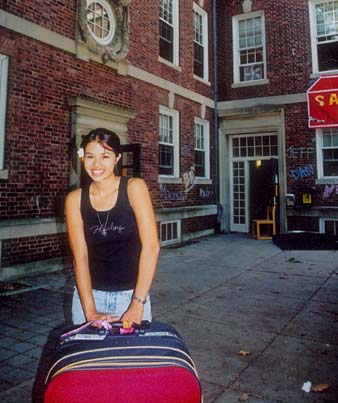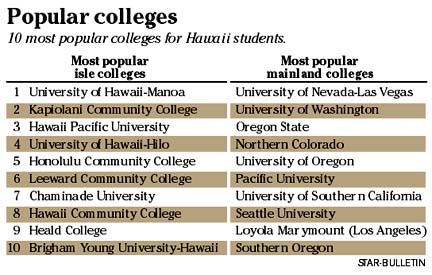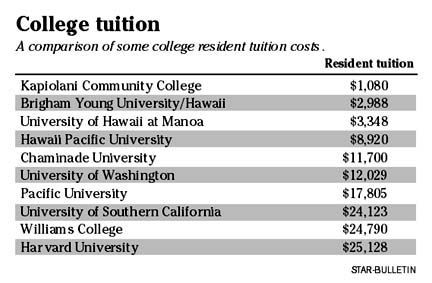
COURTESY RICHARD FASSLER
Many isle students choose to attend mainland schools. Iolani grad Kim Fassler looks a little apprehensive as she arrives at her Williams College (Mass.) dorm.
Do your homework
before picking a collegeChoosing the right school
is especially challenging
for families in Hawaii
So, you want to go to college. But where will you go? It's a big decision, perhaps the biggest decision you'll ever make. It's more than where you'll spend the next four or five years. It's a decision that could affect your career, residence, future mate and, of course, bank account.
Most important is finding the right "fit" -- a school where the student will be comfortable and succeed. In preparing Hawaii's College Guide, we surveyed more than 100 Hawaii college students attending colleges in Hawaii and on the mainland. We also surveyed more than 40 high school college counselors at schools throughout the state.
Choosing a college presents a major challenge for Hawaii students. Most high-schoolers in the United States pick schools within 100 miles of their hometowns. For local kids, it's not that easy. Of some 3,600 colleges in the nation, only a tiny fraction are in the islands. That makes checking them out difficult and expensive. And with the exception of some Ivy League colleges and the football powerhouses, few local residents know what the mainland has to offer. Heard of Grinnell, Bates, Wesleyan, Swarthmore and Bowdoin? They're among the best institutions of higher learning, but mention them to a Hawaii resident and you're likely to get a blank stare.
So, our students head for colleges where their high school traditionally sends its grads, or where their parents went; or where a girl- or boyfriend is going; or their folks have offered them a car if they stay home; or the college is mentioned in U.S. News' annual survey. All of these are bad reasons for selecting a school.
So, how do you choose the best college?
Begin by asking, "Why go to college?" Our research surveys revealed that the following reasons are the most important, and they should be strongly considered in selecting a school.
>> To prepare oneself for a career.
For local kids, this was the principal factor. What kind of work would I like to do? The University of Hawaii is strong in marine biology and tropical agriculture. Heald's Information Technology grads are in demand. Oberlin is an excellent place to study music. The University of the Pacific has an outstanding engineering program. Puget Sound is well known for Asian Studies.
>> To learn new things.
Aside from career-advancement type courses, college presents a once-in-a-lifetime opportunity to study ... whatever. Cambodian language. Insect genetics. The psychology of human sexuality. Video/TV design. And you don't have to travel far -- UH, Hawaii Pacific and other local schools have a great selection of courses.
>> To have new experiences.
Like, living in The Big Apple. Making snowmen. Exploring the Great Wall of China on a study abroad program. Or being the only Asian in a predominantly haole dorm. One respondent chose McGill in Montreal because "no one else in my class was going to do that." The challenge: Child-focused families of Asian descent may want to keep the grad close to home.
>> To become a responsible person.
Almost all students surveyed noted that college has allowed them to "grow up," to learn how to take care of themselves; in short, to become adults. One student is learning how to cook and do her own laundry! Another is working three jobs, putting aside money to pay for tuition and trips home. Kids who live at home, with mom doing the cooking and cleaning, progress much more slowly toward independence.
Some other important factors in choosing a college:
>> Cost. From the above considerations, a mainland school would seem to be the best choice. But going away is going to be much more expensive than staying home. Colleges will tell you they are "affordable." That's because they will offer a package of grants (free money), work opportunities and loans. But a job on campus is still a job, and you're still going to have to pay the money back -- no matter how low the interest rate. "Anyone" can buy a Mercedes (afford Harvard), if they are willing to make monthly payments for 20 years!
Remember: You are a consumer. You are purchasing a college education. Is the University of Southern California, with tuition at $24,123 a year, that much better than UH at $3,348 or Kapiolani Community College at $1,080 ? Kick the tires, as if you were buying a Mercedes!
>> Location. Many students who choose mainland schools do so because they want to "get off the rock and experience new things." That's fine, but many of these "new things," like freezing weather, limited sunshine, lack of the aloha spirit and ignorance of the state drive them back home after their freshman year. Amazingly, for many mainland folk, "Hawaii" still means grass shacks and coconut bras!
As one wanders farther from home, the more flexible, open-minded and just plain gutsy one has to be. It takes a special kid to go to Dartmouth, where New England's winter temperatures will hover around freezing from November through March. We found that athletes do well overseas, perhaps because they tend to be physically and mentally stronger and more disciplined.
To take advantage of low-cost UH, with all the comforts of home, and achieve independence and experience new things overseas, try this: Enroll at UH, and then combine student-exchange and study-abroad programs to enjoy two years away from the islands.
>> Small school versus large school. OK, I'm biased. I graduated from Kenyon, with 750 men in the entire school. I knew the names of half the kids and all the professors. No class exceeded 20 students. Everyone had plenty of chances to ask questions and meet with the professors after class hours. With so few students to compete against, I made the varsity soccer, tennis and wrestling teams. This was in contrast to the University of Toledo, where my sister went, with its televised lectures crammed with 500 students, delivered by teaching assistants from foreign lands in indecipherable English, and almost all the athletes were vying for professionals careers.
Most educators believe that smaller schools with smaller classes are more conducive to learning. That's why the student/teacher ratio is such an important factor in the U.S. News' ratings, and that's why large schools, like UC San Diego, are now dividing themselves into smaller "colleges."
However, many of our respondents favored large schools for the anonymity, the wide selection of classes and activities, and even the excitement of a highly-ranked football team contending for a national title.
>> Prestige and quality. So, you want to go to an Ivy League school or one of those in U.S. News' top 20. First of all, consider the fact that they are a) extremely hard to get into, and b) extremely expensive (with transportation, we pay $40,000 a year for my daughter at Williams). But are they worth it?
More than a few of the students at Ivy League schools told us they chose their school because, well, it was an Ivy League school. But if you want prestige, consider this: Most people in Hawaii couldn't name half of the Ivy League colleges. Back East, your alma mater can be a key factor in your career and social standing. Back home, unless it's Harvard, Yale, Princeton, Cal or Stanford, you're not scoring points. Of the 76 members of our current Legislature, only three attended the Ivies. The vast majority, not surprisingly, graduated from UH. Governor Lingle is a UC/Irvine grad.
In many ways, Harvard is like UH-Manoa. They're both big (about 19,000 students), crowded, with classes in large lecture halls taught by teaching assistants. Some programs are excellent; others are not so hot. What's different about the two schools (other than prestige) is that the average SAT score of Harvard students is 750, while UH students come in at 550. In short, at Harvard you'll meet a lot of bright kids and you'll make contacts among students and faculty who can, perhaps, help you in your career. But UH has a special honors program for students looking for a more challenging academic environment and the profs know the local job scene. Is the high cost of Harvard worth the prestige?
>> Hawaii-friendly. Want to become more independent, but you don't want to stray too far from home? Consider UH-Hilo. It's small (3,400 students), with a fine reputation and a great-looking campus, and it's less than an hour's plane-ride away. On the mainland, Pacific in Oregon is the clear comfort leader. There are 221 Hawaii kids (21 percent of the student body), a Hawaii Club with a full-blast annual luau, and chicken katsu and other local grinds in the cafeteria! Northern Colorado has 158 Hawaii students, a sizeable Hawaii Club, with luau, and an Ohana program where area residents "adopt" students to give them a "home away from home."
>> Party school. One student told us that "college is a four-year, pre-paid party by your parents." We found this to be accurate. A recent issue of the Williams College school newspaper noted that the drinking problem is the college's "dirty little secret." Recent surveys show that 40 percent of collegians are binge drinkers (5 or more drinks in a row). At Williams, it's not unusual for kids to get drunk two or three times a week!
So what? We've all seen "Animal House." Isn't that what college kids do?
Sadly, that's true. And they are doing it more each year. The situation has become so serious that last year, 1,400 college students died in alcohol-related events and 600,000 students were assaulted. A recent issue of the Williams' newspaper headlined that the drinking situation there is "spiraling out of control," causing the administration to warn that it's just a matter of time before a student dies of alcohol poisoning. Fearful of lawsuits, some colleges are fighting back but they don't seem to be making much headway.
Students who drink heavily often don't attend classes and do poorly in school, not to mention the fact that the women are putting themselves at risk for sexual assault. Parents, remember: Colleges won't supply you with your child's grades or health reports.
Many small colleges (Williams, Dartmouth, Kenyon) have serious alcohol problems because they're in remote locations. Drinking is a major social activity because "there just isn't anything else to do."
With fraternities banned at many campuses, the drinking scene has spread to the dorms (most of which now are co-ed), creating vandalism and "date rape" problems.
Fortunately, Hawaii has a school that is totally dry. Like its counterpart in Utah, Brigham Young-Hawaii will not tolerate a drop of alcohol on campus. The university's strict regulations are not for everyone, but if it's sobriety you're after, BYUH is the place.
>> Safety. UH recently announced that there have been seven sexual assaults on campus so far this year. USC, Chicago, Penn and Yale are fine schools, but they're surrounded by neighborhoods that are just plain dangerous. The best way to check out safety is to go to the campus newspaper's Web site. The kids tend to tell it like it is.
Visiting the school
A last word: Before selecting a college, check it out in person, even though this may be expensive. People will take a car apart before buying it, but will spend $100,000 on something they haven't seen and don't know much about. Only half of the students surveyed visited their campuses before enrolling. Many would have changed their plans if they had.When is the best time to visit? Following the student's high school sophomore year. You will have sufficient time to learn and satisfy the admission requirements, and you'll have enough time to explore the many facets of many schools. If you don't, prepare to be startled.
I was. My daughter's room -- no bigger than a cell -- would be shared with a gal who was six feet tall! For most of the year, my daughter slept in a ski jacket under five blankets. And I was shocked to find a co-ed bathroom, with a thin, loose, plastic curtain the only barrier between my kid and a guy shaving four feet away! Other parents have arrived at colleges only to find that the picture-book campus of the brochures was located in the midst of a high-crime ghetto.
Once again, choosing a college is a big decision. Be sure you do your homework!
C. Richard Fassler is the author of Rainbow Kids, a study of Hawaii's hapa-haole children. He plans to publish Hawaii's College Guide this Spring.


